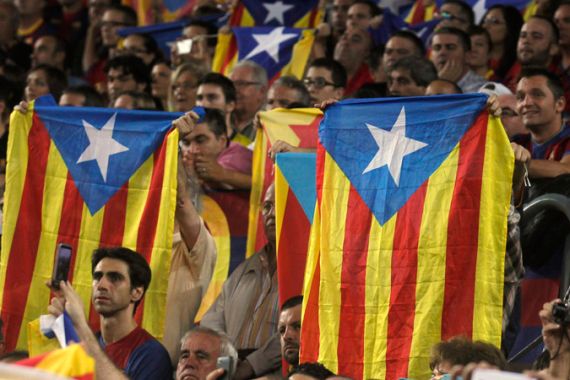Spanish PM slams Catalan separatist bid
Mariano Rajoys says bid for independence defied common sense and says Spain is not in need of a bailout plan for 2012.

Spain’s Prime Minister Mariano Rajoy has dismissed Catalan’s drive for independence while signalling a bailout plan for the country was all but ruled out for 2012.
Rajoy, speaking to Cope radio on Tuesday, said the pro-independence drive in Catalonia defied common sense and the sweep of history.
“The approach that is being taken here goes against history, goes against the sign of the times, and goes against simple common sense,” the prime minister said.
Catalonia’s president Artur Mas has called for snap elections in the region for November 25, seeking a mandate to call a referendum on “self-determination” as Catalans rise up against austerity measures they blame on Madrid.
Rajoy’s ruling Popular Party government has vowed to stop any such vote, insisting that it would breach the constitution, and decrying Mas’s manoeuvre as a divisive step in a time of economic crisis.
“I think we have to face things with calm and serenity,” the prime minister said.
He said there was a global trend against raising new walls and frontiers, citing the examples of the United States, Latin America and the European Union, where Madrid is seeking greater integration. Catalonia’s position flouted this, he said.
“So it is a deal in which we all lose, all Spaniards and in particular the Catalans.”
Catalonia, fiercely proud of its distinctive language and culture, feels it gets a raw deal from Madrid, which levies far more taxes from the region than it returns when redistributing the wealth.
Bailout plan
Meanwhile, the prime minister also gave the clearest sign yet that he sees no reason to trigger a bailout this year.
Spain has nearly completed the bond issues required to finance the government’s operations throughout 2012, he said.
“For now we have covered practically the entirety of our issues through this year,” Rajoy said.
By October 23, Spain had raised a gross $110bn in medium- and long-term bond sales – equal to 95.1 per cent of its 2012 target.
Spain’s total gross financing needs for this year amount to $238bn, a goal that rises to $265bn next year.
Spain may yet be forced to seek external assistance, however, Rajoy conceded.
“If we see that during a long period Spain is financing itself at very high prices then we would have to ask for it,” he said.
But the crucial question, the Spanish leader said, would be whether any European Central Bank intervention significantly curbs the country’s borrowing costs.
Catalan independence
The Spanish government has agreed to extend $6.9bn in rescue funds to Catalonia, which is governed by Mas’s conservative nationalist coalition Convergencia i Unio.
“I am not going to allow Catalonia or any region to go broke,” Rajoy told the radio, vowing to pursue negotiation as far as possible.
The Spanish premier said the one request no-one should make of him would be to break the law.
“So I am going to try to speak, I am going to try to hold a dialogue, I am going to exhaust every possibility. I think this is the time to act with common sense,” Rajoy said.
But it was up to Mas to resolve the tensions, he said.
“I think that one of the obligations of people who govern, of anyone, is to resolve problems and not create problems for the people, not to create divisions,” Rajoy said.
“Because this is creating divisions in Catalonia, between the citizens of Catalonia,” he added. “And now Mr Mas has an enormous responsibility to resolve the problem that he has created with his attitude.”
Hundreds of thousands of Catalans flooded Barcelona on the region’s national day September 11, many of them demanding independence as a new nation in the European Union.
According to an opinion poll published on Sunday in Catalan newspaper El Periodico, 50.9 per cent of the region’s people favour an independent Catalan state.
That number falls to 40.1 per cent, however, if independence would mean leaving the European Union.